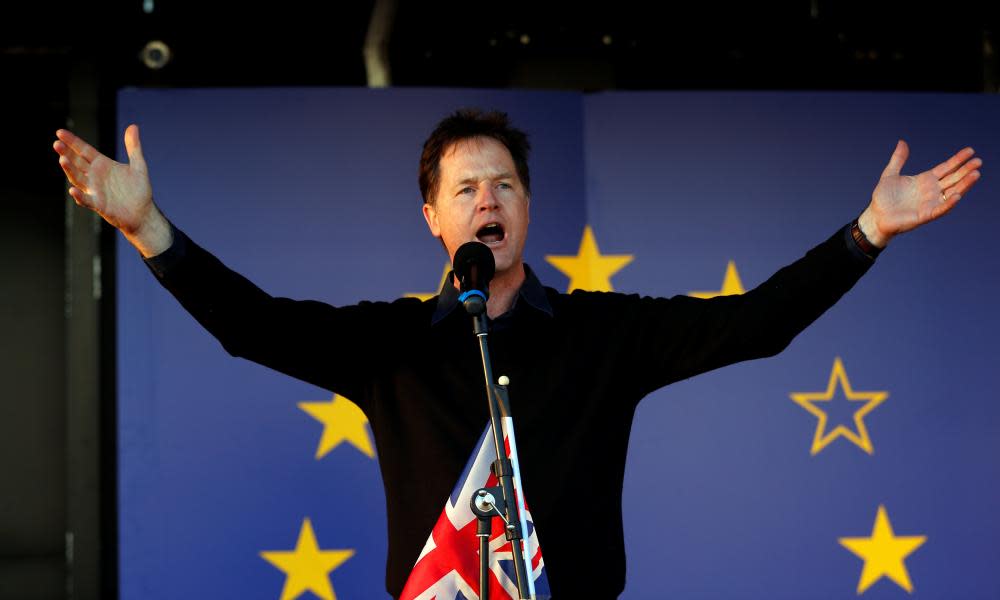Whether to like Nick Clegg’s move to Facebook

I am a long-term supporter of Nick Clegg and appreciative of his instinctive liberalism, but his lack of judgment in choosing his collaborators has now shown itself again, this time in spades, in choosing to join Mark Zuckerberg at Facebook (Clegg abandons remain campaign to take job with Facebook, 20 October). Frankly, it is a bad move. If Nick was unable to force a better deal in coalition out of David Cameron and the Conservatives, how is he going to transform the inherent inevitability of the insensitivity of the vast Facebook machine? It is far too large and bureaucratic to be capable of any worthwhile measure of change.
It is also a badly mistimed move. Nick has always been one of the best proponents of the case for a united Europe and, at precisely the time in our history when every such voice is needed to continue the momentum for rescuing Britain and the EU from a disastrous Brexit, he is abandoning the cause. It leaves a bitter taste in the mouths of his friends and colleagues who value loyalty and commitment to the most important cause of the past 70 years.
Michael Meadowcroft
Leeds
• Reading Nick Clegg’s article (I’m joining Facebook to help tech to be a force for good, 20 October) I looked in vain for any mention of Facebook’s glaring refusal to pay its fair share of UK taxes. The greatest good that tech could achieve would be Facebook paying these taxes as its contribution to the common good. In the UK, Facebook paid just £5m in tax on revenues of £842m.
Sadly, it’s no surprise that Mr Clegg fails to raise this issue in his article. He has a poor track record when standing up to power: he is responsible for propping up the Tories’ ideological, small-state austerity programme from 2010 to 2015, and the incalculable harm that has done to the wellbeing of our country (evidenced by gross inequality, rising crime, increasing mental ill-health and, indeed, the Brexit vote). I have no expectations that he will find sufficient character to speak truth to power in the case of Mr Zuckerberg and his taxes.
Professor Mark Doel
Sheffield
• I must admit I was surprised to read of Nick Clegg’s appointment as Facebook’s vice-president of global affairs and communications and that in the New Year we will lose from our beleaguered shores, a committed and vocal remainer.
But I think this is a canny decision by Mark Zuckerberg because for what it is worth, I feel that Clegg has been subjected to unnecessary vilification from the press and his former Conservative associates. Contrary to received wisdom that the Coalition years were a cop-out, I look back at a certain halcyon period where he and his associates ameliorated the more divisive policies from their partners and it led to a period of a pragmatic stability than what has followed. I sincerely hope and believe that he will be a force for good in his new role and bring some much-needed sanity to social media because it has certainly morphed into a sometimes cruel and crass entity. What is wrong in our country today is that politicians never escape their legacies and his is the spectre of tuition fees and that appears to cloud every subsequent action. That in my opinion is wrong and counter productive, and we have now lost a dedicated man who maybe didn’t get it right all the time but did exude a sincerity that is sadly and disastrously lacking in many of our politicians who appear to have their own ulterior motivation, contrary to the ultimate good of the country.
Judith Daniels
Cobholm, Norfolk
• I hope that, as vice-president of global affairs and communications at Facebook, Nick Clegg will not spend all of his time dealing with issues of fake news, anonymous political adverts, and the selling of subscriber identities in Europe and North America (or, God forbid, explaining why Facebook should not pay more tax). As someone who studied anthropology at Cambridge University, Clegg needs to turn his attention to Asia, where there are more Facebook users than in North America and Europe combined, and specifically to India, Sri Lanka, and Myanmar, where Facebook and WhatsApp have played a key role in creating an environment where, in certain unfortunate places, the idea of pogroms and lynchings directed against Muslims has been normalised over the last couple of years.
David Gellner
Professor of social anthropology, and Fellow of All Souls, School of Anthropology and Museum Ethnography, Oxford
• Join the debate – email guardian.letters@theguardian.com
• Read more Guardian letters – click here to visit gu.com/letters
• Do you have a photo you’d like to share with Guardian readers? Click here to upload it and we’ll publish the best submissions in the letters spread of our print edition

 Yahoo News
Yahoo News 
